Warning: SPOILERS for pretty much every Christopher Nolan movie. Including Tenet.
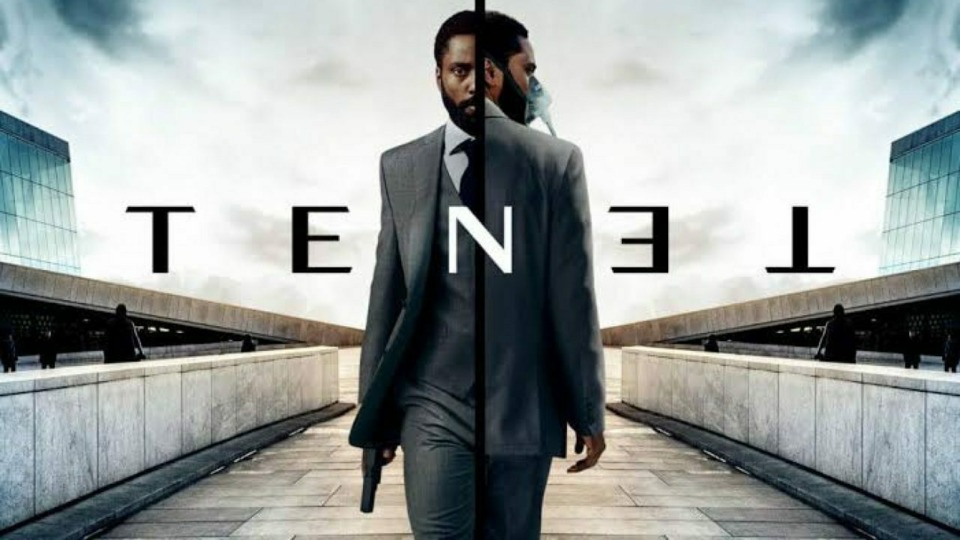
Let no one say that Christopher Nolan is devoid of ambition.
A man who loses his memory every few minutes, his story told in reverse. A professional thief who not only breaks into his target's dreams, but creates those dreams for them to inhabit as well. An astronaut who saves the Earth by communicating with his daughter through space and time in a black hole. These are all interesting ideas in theory that could easily fall flat, or even be catastrophic trainwrecks, with the wrong execution. Now, mileage may vary with these fillms -- Interstellar/Dunkirk especially -- but for my money, Nolan has hit the mark perfectly almost every time. (With the glaring exception being The Dark Knight Rises, a film that he may not have even wanted to make.) There's a same-ness in his oeuvre, for sure, but they've all functioned on a purely dramatic level, while playing with mind-bending ideas most $250 million films wouldn't even attempt.
And Tenet, set in a world of international spies travelling backward through time, has all the same surface aspects of a successful Nolan outing. The premise is esoteric, but simple enough for audiences to "get" in a broad stroke: the future is waging war on our present, backwards through time. GOT IT. The cinematography and production design are slick, the music and atmosphere fit this "Twilight World" perfectly, the lead cast members give great performances, and the action scenes are suitably large in scope and ambition.
But despite all that, Tenet might be Nolan's weakest movie since The Dark Knight Rises. More than that, its problems are not the kind of nitpicky plot holes that entire YouTube channels have made a career from criticizing Nolan on, but fundamental dramatic missteps.
Now, that's a really harsh thing to say, so let me back up a bit and explain where this take comes from.
On Dead Wives
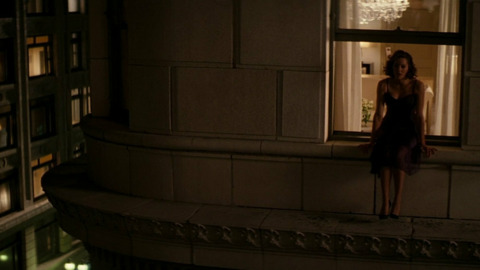
Critics have rightfully pointed out that Christopher Nolan goes back to the same problematic trope rather often -- the dead wife that gives our main (male) lead motivation and pathos. The death of Guy Pearce's wife in Memento set his quest for revenge in motion, which was manipulated by another party for their benefit; the death of Hugh Jackman's wife in The Prestige set his quest for revenge in motion against Christian Bale; the death of Leonardo DiCaprio's wife in Inception set his quest to return home in mo -- okay, you get it. This is obviously not a great look for Nolan in 2020, and more than a little macabre for his wife, Emma Thomas, but these backstories serve a crucial function in the screenplay. They give the main characters a clear motivation the audience can follow, and they're executed pretty effectively. I'd argue Inception is one of the best uses of this trope, because not only does it give Cobb an initial motivation, but his obsession over his dead wife continues to complicate the story and create interesting new obstacles to overcome throughout. (Think of the "oh shit" moment when Mal shows up in the snow base to shoot Cillian Murphy in the back, and Cobb can't take the shot -- or that wonderfully creepy scene when Ariadne sees Cobb's dreams.) Of course, motivations don't need to be dead wives (god no), they just often show up like that in Nolan's work. It can be something as simple as "we need to get the hell off this beach" in Dunkirk.
So with that established, let's ask ourselves: "What is The Protagonist's motivation in Tenet?"
Seriously.
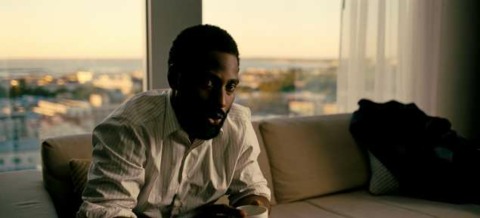
We know that he is a spy of some sort, likely working for the CIA or an equivalent. From the first real exposition in the story with his handler, we know that he is dedicated to "the mission." That he'll do whatever it takes to follow whatever orders he was given (a "tenet" if you will). Given that he has a barebones name like "The Protagonist", we can tell that his backstory/motivation is intentionally sparse, either for mystery or to let us focus on the plot as quickly as possible. Later on, we can infer that he wants to protect Kat from her abusive husband Sator, and there is supposed to be conflicting motivations between accomplishing "the mission" to stop Sator destroy time itself, and protecting Kat. Now, like I said earlier, a simple motivation can work -- but this is as thin as it gets. Even John Wick, which everyone lauded for its economy of storytelling and motivation (they killed my dog, I must kill them), took the time to establish why this dog was so important. We saw John grieve for his wife's loss (SO MANY DEAD WIVES), saw how the dog was one last gift to him from her, saw this bring some joy back in his life, however small -- and then the gangsters kill the dog, so when John is heartbroken and furious, we feel some of that too.
To that end, there is no "why" in Tenet for our main character but the plot itself -- save the world. Maybe more charitably, we can say the motivation for him is the same as the audience's, uncovering the mystery of what "tenet" means, as his handler tasks him. This kind of impersonal distance can work -- a lot of great thrillers are intentionally sparse on the character details -- but this puts a lot of importance on the plot, how intrigued we are in the mystery. Because The Protagonist has no stake in this for a long time, other than, "it's his job."
And the plot of Tenet is not particularly compelling.
Nolan's Usually Good at Exposition, but...
In one scene, The Protagonist's handler tells him that there's a shadowy underbelly to the world he wants investigated, and all they know is the word "tenet." Cryptically, he says, "Use that word, but be careful where -- it may open some doors you want to, and others you don't" or something to that effect. Cue the very next scene, where the very first person he says "tenet" to in a labcoat reveals almost everything upfront. I'm not kidding. The scene goes:
"Tenet."
"So we've been seeing guns and bullets come backward through time, find out where they're coming from."
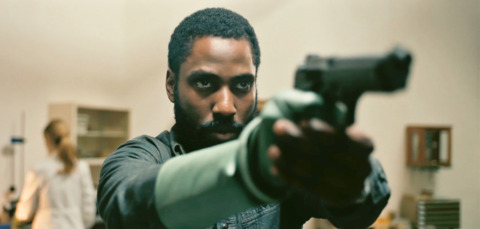
This starts a trend the movie never recovers from, where everyone The Protagonist comes into contact with already know more than him, and simply tell him what's happening as flatly as possible. This is a shadowy world of time travel that no one knows anything about! Except everyone you've ever met actually knows about it, and know more than you about it, to the point that there are dozens, if not hundreds of soldiers who are in on the time travel. This is getting dangerously close to just saying "durr, that's a plot hole", but it's more than that. It robs the main character, and therefore us as the audience, of the joy of discovery, something crucial in an action movie that's trying to play up the mysterious sci-fi angle as much as this one. Imagine The Matrix if there wasn't that 30 minute build-up to the "twist," if Neo asked Trinity at that night club, "What is the Matrix?" and she just said, "You live inside a simulation, your actual body is in a pod being harvested by machines. Bye!" That is almost every bit of exposition in Tenet. Even characters like Neil (Robert Pattinson) who aren't supposed to know anything, are revealed in a "twist" to actually have known everything about time travel since the beginning.
This is so strange, because Nolan is usually great at exposition. To go back to Inception, you have entire scenes that are just Arthur or Cobb explaining to Ariadne how the rules of the world work, but they're still compelling because there's drama there. Notice how in the exposition with Arthur and Ariadne, she's also teasing out the details of Cobb's inability to build dreams any more, learning more about Mal. Having these character dynamics help pure info-dump scenes, but that's pretty darn tough when your main character's entire reason for existing is "gotta do the thing."
The one potential upside of such cut-and-dry info dumps is that the audience (if their eyes don't glaze over) can follow the story clearly, but in Tenet, we don't even get that benefit, as the audio mix garbles the dialogue so thoroughly you just can't understand it without subtitles. Between that, and the overly convoluted plot of the middle of the film, ("We need to put pressure on this art dealer who's the wife of the bad man because she made a bad deal or lost this art piece that's worth millions of dollars for the bad man, so pose as an art guy yourself to put yourself in their circle, except now you're posing as an arms dealer for the bad man to work with and this involves the opera house from the beginning of the film somehow and AAAAAAAAAAA") it's really difficult to follow. Thus, a good chunk of Tenet is characters with no reason to care about each other, mumbling at each other in an inaudible audio mix about a plot I didn't understand but in the broadest strokes.
And that can be fiiiiiine, I don't need to get every little machination of the plot if at the end of the day, the big emotional moments and turns in the climactic action scenes are still understandable. So, are they? As the movie says, "Don't try to understand it, just feel it." Is there enough here to get out of my own way, and just "feel it?"
(Laughs nervously) Um.... no. Not really.
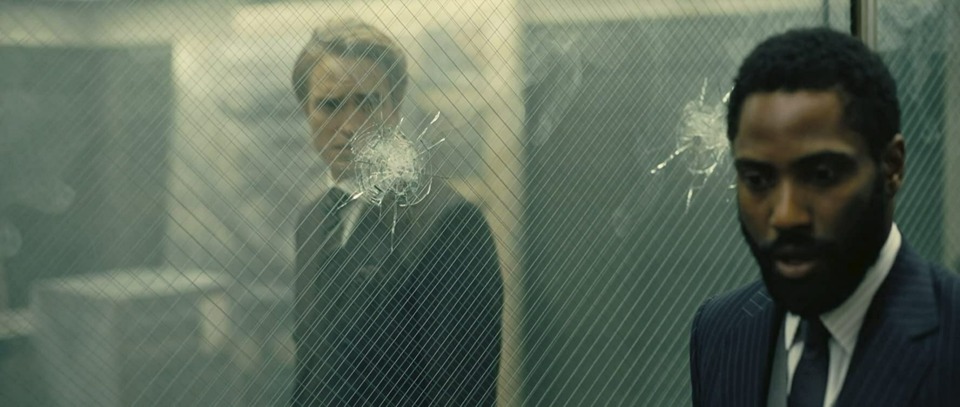
The Ending of Tenet FINALLY EXPLAINED!!!1
There's this misconception that Nolan movies, because they dabble in mysteriousness and big ideas, are somehow giant puzzles to solve even after you've finished watching them. Just today, while writing this and listening to S.T.A.Y. from Interstellar, I saw in the YouTube recommendations a video titled, "The Ending of Interstellar Finally Explained"... posted nine months ago. Now, you might not agree with some of the turns the end of Interstellar took (communicating through space and time in the middle of a black hole really did break some of the more left-brain viewers), but is the ending really that much of a mystery? Humans from the future gave Matthew McConaughey the equation to solve interstellar travel. He then gave this equation to his daughter, Murph, back on Earth. This saved humanity, and because we're dealing with, essentially, Space Magic at this point, he was teleported back to our solar system. He has a heartfelt goodbye with his daughter, and goes out to find a stranded Anne Hathaway. The End.
Inception had a similar reaction -- "woah, was Cobb really dreaming at the end or not? let's post hour-long videos trying to figure out the right answer, as if that's the important part of the movie!" I want to linger on this, because this ties into my issues with Tenet.
Let's clear this up right here and now -- Nolan movies are not meant to leave you scratching your head after watching them.
The core emotional beats are incredibly evident. Yes, there's a little bit of mystery at the beginning of these movies, but by the end, they have explained enough and established enough of the character motivations/relationships to land gut-punching emotional moments without even a word of dialogue. Think of the rows of Hugh Jackman's own cloned corpses at the end of The Prestige. Or think of Cillian Murphy finally having the reconciliation he's sought his entire life with his father near the end of Inception, holding a paper windmill from the one photo he put by his dying father's bedside. I tear up thinking about it now, that rush of catharsis with a distant family member, that is still a lie because this has all been constructed by Cobb for his own ends. Or, back to Interstellar, Matthew McConaughey has been slowly and surely drifting away from his daughter, the core relationship of the entire film. At the end, there is space mumbo jumbo about the "fourth dimension" and communicating through love, and messages from future humanity, but it all resonates and works anyway in that moment because he's finally reuniting with his daughter when he plucks those strings in the black hole. Murph, who thinks her father abandoned her for space travel, finally hears from him again, and realizes he's still out there and still loves her. All while also being the moment where humanity is saved -- it's cathartic stuff. Some people found it saccharine maybe, but no one missed what was being said there. To put it like Tenet might, you didn't have to understand it to "feel it." As crazy and convoluted as Nolan's machinations got, there was always a core emotional, dramatic thread to the story to keep the audience grounded.
This is what Tenet lacks entirely. I've already brought up my issues with the lack of character motivation, how the main character is the passenger in his own story thanks to the style of exposition, but the real killer here is what I haven't brought up yet, and that's basic comprehension of the big action scenes and climactic turns. For how Tenet has been marketed, this is the reason to see the movie -- watch the master of the big screen create the most elaborate, mind-bending action scenes you've ever seen!
In some ways, it delivers on this promise.
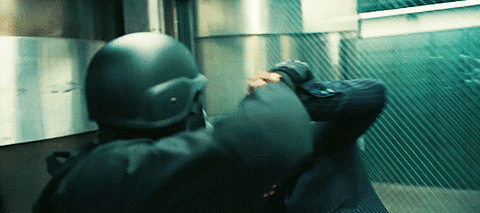
The craft and spectacle in the action scenes are very impressive. I can't imagine how much time and effort went into logic-ing out the choreography of that first hallway fight with the Protagonist's future self -- and it pays off. I don't understand much of what's happening moment to moment in that fight, but because it's a one on one fight, it's very easy to let it wash over you and just admire the spectacle of this guy being suplexed off the ground, or sliding forwards while writhing like he's being dragged backwards. Similarly, the truck heist in the middle of the film is fantastic, as the stakes are clear and the time travel doesn't get in the way of understanding them -- there's a case to steal from this truck, we are stealing this case, and now mysterious cars from the future are driving backwards on the highway to steal the case from us. Aspects of the time travel are clever as well, like the super clear visual language of going backwards by entering a vault, seeing both your past and future self walking along different sides of some partition glass. The first scene the Protagonist goes through one of these vaults is one of the more visually impressive shots in Nolan's career. Again, these all work because you might not understand the nitty gritty of the mechanics, but you understand what's happening in the overall story.
However, the longer Tenet runs, the more that moment-to-moment understanding slips away, as more and more complications are being thrown at the time travel rules. For instance, as the Protagonist first starts to go back in time to steal the case from Sator on the highway, it is an absolute nightmare to follow. You get the gist -- Sator has the case, Protagonist wants to get it back. But the scene now involves not just 2 parties: someone going forward through time, and someone going back through time. This now involves 3: 2 people going back through time, and 1 person going forward through time, which is really tough to parse in terms of visual storytelling, the bread and butter of action films. These things live or die by how much you understand in an action scene in a split-second, and by those standards, this scene fails. The Protagonist tries to intercept the case, but this somehow gives Sator the case. Even though he already had it. That is all I parsed from the scene, because it's very difficult to tell what's supposed to be a dramatic turn for the worse when you've already seen it happen earlier in the movie.
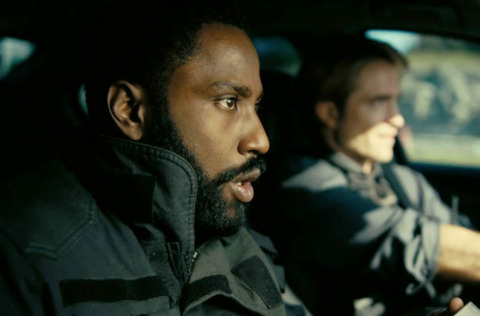
This continues with the climactic battle scene, which involves two entire armies fighting each other backward and forward through time at the same time in an abandoned quarry with some ruined buildings, easily the least impressive scene in the film. On the good guys' side, one platoon is going forward through time, and the other is going backward, attempting to defuse a bomb that's going to destroy all of time. But the bad guys also have one squad going forward and one squad going backward, and it becomes an indecipherable cluster, even after a five minute exposition dump explaining what the plan is. In here, it's harder to let it all wash over you, because the mechanics are no longer just details you can ignore, but crucial to understanding what's happening in the story. To the best of my understanding, the bomb gets buried after a tripwire explodes the entrance to the mine it's in, but Robert Pattinson goes from going backwards in time, to going forwards in time, only to go back again (I'm serious, he starts going in one squad or the other, but then uses one of those reversal vaults and AAAAAAAAAAA). It gets bad enough that the climactic showdown, involving the Protagonist trying to defuse the bomb, but being blocked by one of Sator's henchmen and a locked gate, is also tough to follow. This is important. This is your "yipee-ki-yay" Die Hard momentwhere, when all seems lost, the character's ingenuity turns the tables and saves the day. The problem? I don't know how he did so. He just stared at the lock and it got shot by Robert Pattinson or...
You know what. I'm boring even myself with this blow-by-blow. Let me just say I understood none of it other than the most basic "yay, he defused the bomb" or "oh no the bomb gonna explode." Yes, there are literally two fronts of time-warfare occurring at once here, but it boils down to lots of gunfire and explosions happening in reverse around the characters, so... it's a lot of effort for something that ends up imparting the exact same feeling as say, Black Hawk Down.
The bigger issue is that this admittedly clever premise starts to make the movie less interesting from a character or dramatic perspective. The big twists, like the fact that the second half of the movie is dedicated to going backward through the first half, means that there's very little tension because we've already seen it go fine before. Remember that hallway fight I praised? Well, you get to see it again, and the outcome goes the same. A fight scene where you know what happens is inherently less exciting, and that's a good chunk of Tenet. The characters don't get out unscathed either. We learn next to nothing about either Neil or the Protagonist, but, we learn that they become really good buddies in the future, so that's a lot of character development you can just hand-wave away. And this isn't a nit-picky thing, either -- Robert Pattinson was the best part of the movie, and the movie's clever ideas deprive us of seeing more interesting interactions with him. We never see his relationship with the Protagonist develop, never earn any camaraderie, so that when we learn he's marching off to his death in his last scene, it's an "awww", but not nearly as affecting as some similar moments in earlier Nolan movies.
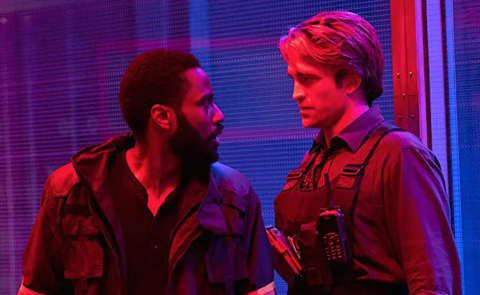
The Protagonist gets even more scammed by this setup than Pattinson -- because, as it turns out, literally the entire Tenet program was founded by him... in the future. So the mysterious people he has been taking orders from are... himself. In his words, when he's talking to the Indian arms dealer -- "I thought I was taking orders from you. I was actually taking orders from myself, to you." Which, I see what they're going for, in a Matrix-y sense -- he's the One and doesn't even realize it. Heck, you could make an argument that his super slight character motivation and background is intentional for this twist -- his character arc is one of self-realization of agency, from taking orders to being the master of his own destiny. And that's pretty clever! The problem is that while this is satisfying in hindsight, it doesn't make the present moments in the film any more engaging. We just spent 2 and a half hours watching the main character be shuffled around from taskmaster to taskmaster, only to learn the ultimate taskmaster was HIMSELF! But that doesn't change the fact we watched him be an errand boy with no interior or motivation of his own throughout.
(As an example, imagine a twist in Grand Theft Auto, where all these characters give the protagonist meaningless errands to do, but at the end it turns out that the main character told those characters to tell him to do that. It works about as well as that. Which is to say, it doesn't.)
To continue the Matrix example a bit further -- even in that film, that hinges entirely on Neo being an ingenue who has to accept this power that has been bestowed upon him, there is a clear scene of self-realization. When he jumps off the helicopter to save Trinity, we all understand before even a line of dialogue occurs, that he is absolutely the One. Now imagine The Matrix where Neo does nothing, Trinity saves the day, but Morpheus calls at the end and says, "hey Neo, by the way, you're the One!" Tenet is a lot like that.
On that note, one last thing...
On Living Wives (Or The Women in the Nolanverse Who Don't Get Enough Credit)
This is going to be a much smaller side note, but I thought it was worth pointing out -- Tenet is kind of unusually weird about women, even for a Nolan movie. Pretty much the entire emotional core of the story is attempting to revolve around Kat and her abusive husband Sator. In many ways, she has more character depth than the Protagonist. She has a motivation -- to protect her son. She has an obstacle -- her piece of shit husband might kill her if she sticks around, and he'll only let her go if she gives him her son as well. And she has an arc -- she goes from helpless to murdering the guy.
Now. Despite that, there are a lot of problems here. First, I don't think I need to point out how thin a character is who is entirely defined by her abusive relationship. Second, the movie goes for several cheap shots with her character. To establish what a bad dude Sator is, we get not one but two scenes of him verbally or physically abusing her, which doesn't make me hate the guy, it just makes me uncomfortable they put this on-screen. Third, her sole motivation being her child's wellbeing goes to pretty absurd lengths in the dialogue. One character says, "If this happens, the entire world will end!" to which she replies, "And my son will die!" No shit, really? Fourth, her largest contribution to the story -- killing Sator -- is marred by how the screenplay unintentionally paints her as reckless for doing this. Some pretty clear stakes are established near the end saying, "hey, make sure to only kill Sator if you get the signal, otherwise his dead man's switch to the bomb might go off and the world will end" (not to mention your son will die!) So, with that established, she doesn't get the signal, and she ends up killing him prematurely anyway. Sigh.
Elizabeth Debicki does well with the role, but man did she deserve more.
Also the triumphant scene of the film where the Protagonist realizes he's the ultimate badass is him shooting the Indian arms-dealer lady in the back of the head WHAT THE FUCK? That was like, one of three women in the movie you just killed, buddy!

Alright, Let's Wrap This Up
If you've made it all the way down here, thank you for your patience and time! I really appreciate it, and hopefully you enjoyed it. Sorry for the constant Matrix references, it just kinda cropped up given the similarity in genre.
If you did enjoy it, or any of the other longer-form things I've written here on Giant Bomb, I have a dusty blog about sometimes-games, mostly-movies, called Lapses in Taste. This is the first piece I've written for it in... several months? So it's not the most regularly updated thing, but I'm usually very happy with what I post there. I'm particularly fond of the Bumblebee and Scott Pilgrim essays.
TL;DR This is the first Nolan movie I've seen where the "big idea" actually gets in the way of the story working on an emotional level. Certain action scenes were cool, the aesthetic was great, I loved all the performances, but the characters had nothing going on, the moments that were clearly meant to be "WOW" moments just didn't hit, and I left bored, not caring to even see it a second time to figure it out.
Now that it's out on VOD, how'd y'all find Tenet?

Log in to comment